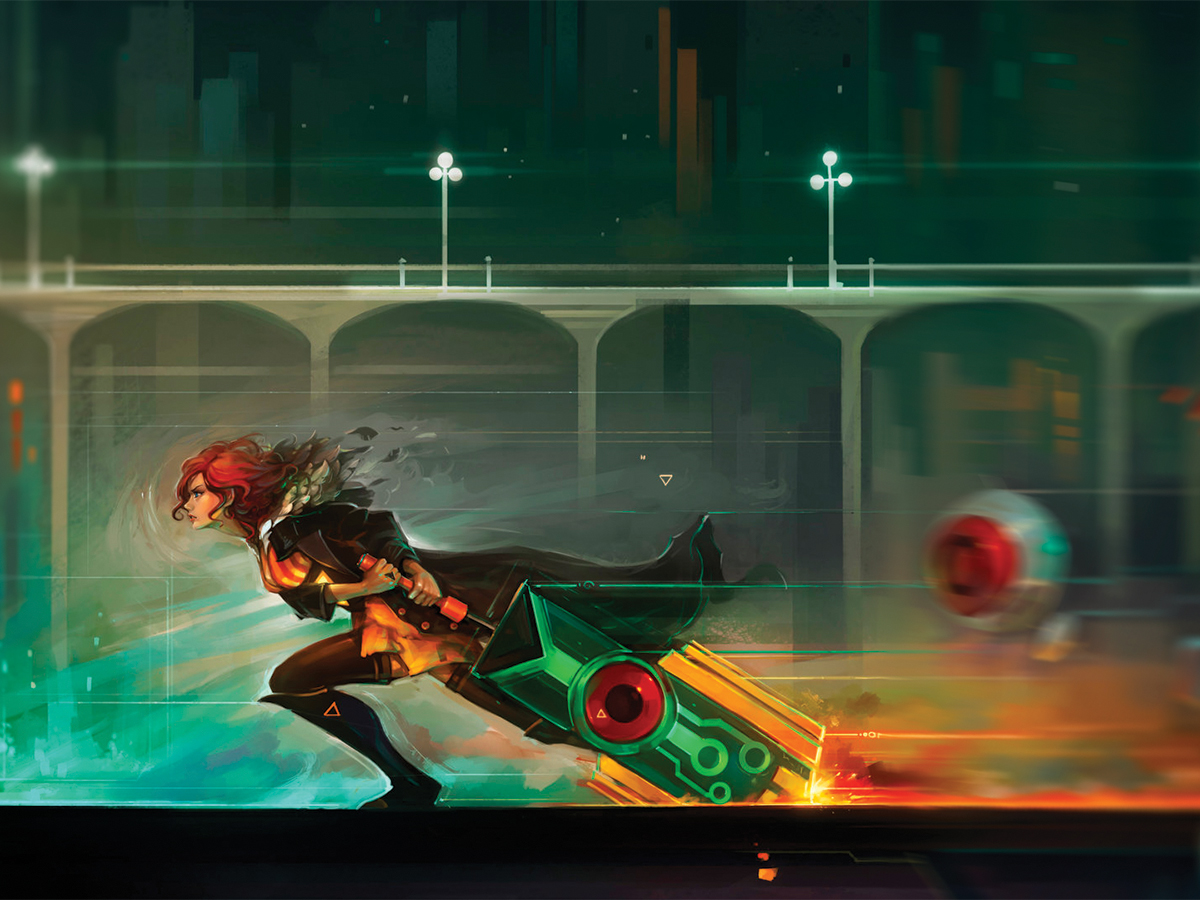
Supergiant Games were coming in hot after their successful debut action role-playing title “Bastion” had won numerous awards and accolades. The pressure of attempting to catch lightning in a bottle again in an artistic medium (especially one as fraught as the game industry) is a Herculean task. And yet, after a particularly difficult and long development cycle of reinvention, “Transistor” would rise to the challenge.
“Transistor” is a devilishly smart action role-playing game with clever mechanics based on real-time and turn-based design principles. Even setting aside gameplay, there is a lot to love about “Transistor.” It is accompanied by a gorgeous color palette and a wholly unique aesthetic that can best be described as art deco cyberpunk. The characters avoid being conventional caricatures and stereotypes. Our main heroine is Red, a jazz singer in the city of Cloudbank. From the start, she is a character with her own motivations and agency, lending a degree of empathy to Red’s struggles. Joining you for the journey is the Transistor, a mysterious sci-fi greatsword with his own pleasant personality. “Transistor” largely works because each aspect is thematically and tonally consistent.
“Transistor” is set in a creative bastion where everyone has the means to achieve what they want in order to best serve the goals of Cloudbank. The story of “Transistor” starts in the middle of the story; from what we can piece together, an assassination was attempted on Red by the Camerata (this world’s illuminati). The group was using the Transistor to control the Process, a hive-minded robotic entity that assimilates people, to attack her. The Camerata loses control of the entity when it falls into Red’s possession. Although she loses her voice in the attack, she survives only because her lover steps in to take her place. After being fatally stabbed by the Transistor, the man’s consciousness now only exists within the sword itself, acting as a guiding voice and literal weapon to reinforce Red’s tenacity on her path to save the world from being “reset” by the Process and bring the Camareta to justice.
Although the Camerata are the main antagonists of the game, they’re never exactly mustache-twirling villains. They too are nuanced in their characterization which lends them a degree of sympathy. The members of the Camerata formed the group in response to personal dissatisfaction with the small changes enacted by the citizens of Cloudbank, stifling the potential for bigger changes. Ultimately, the Camerata didn’t really have grand ulterior goals with Red, they just messed up when trying to use her and subsequently, the society collapsed because of their ambition. Thematically, each individual Camerata is a foil to Red, acting as a mirror of sorts to deepen our understanding of her and the relationship she has with the world. By the end, there is catharsis in the story and character’s resolution, but one can’t help but feel a sense of melancholy. Every victory in a way was also a defeat — a mutual acknowledgement of the potential good that exists within others that’s purposefully squandered. Each character’s motivation then becomes a means to further build out what type of world Cloudbank is.
Further worldbuilding was done by the game’s mechanics to instill this notion. In terms of gameplay, the game implicitly trusts you to have the creativity to play around with its mechanical depth. “Transistor” carries over the isometric view Supergiant is known for, but it adds innovative twists on combat by mixing turn-based planning with real-time action. In combat you have four main slots from which you can choose and equip functions of your core abilities.
Narratively, functions assist with worldbuilding by exemplifying the spirit of Cloudbank. Each function used to be a citizen of Cloudbank, accompanied with a subject card detailing who they were and their role in the city before the Process integrated them. When Red reintegrates each citizen into the Transistor, citizens are given a new function. The uniqueness of each function then becomes a commentary of the promotion of individuality and potential of collaborative effort in Cloudbank. Losing in battle also becomes slightly more horrifying because instead of restarting anew, you have to continue forward without someone that was just by your side.
The aesthetic choices in the game’s art style further implies another aspect of the ethos in Cloudbank. Art deco was a prominent aesthetic choice of the Roaring ‘20s and carries with its organic design, a sentiment of optimism for the future. In contrast, cyberpunk carries with it the potential and shortcomings of living in a place created by technological progress. “Transistor,” then, is a weird paradox. Cloudbank is romantic, elegant and sprawling to look at, yet totally saccharine and parasitic in its artifice. Its world is dystopic and proposes that the structures in place are unstable by the very nature of its design. The “progress” the citizens of Cloudbank seem to enjoy lend to a sense of stagnation and dissatisfaction for others. These “others” would then form the Camerata as a response to this nihilism, setting off the events of the game. “Transistor” seems to argue that this oversight in not truly being able to account for everyone’s autonomy will inevitably doom the world.
The genre of science fiction has always been in one way or another a means of holding a mirror to our own society, and “Transistor” is no different. The immaculate design of the mechanics gives robust options in creative tactical play that are satisfying to execute. The characters are infused with a type of charming gravitas and personality uncommonly found. Every aspect of the game (even the amazing soundtrack) does a lot of work to flesh out a fantastical yet believable world. Most of all this worldbuilding was done in service to elicit introspection on the nature of our world leaders and how their ignorance, incompetence, narcissism or outright malice affects the citizens of the world and how the game advocates for empathy on those affected.







